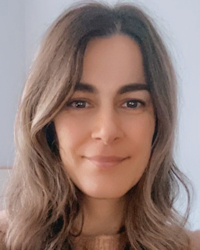
Ms Denise Tsirtsakis
Social Worker, Solution Oriented Counsellor
Elpida - Therapeutic Supports
Melbourne, VIC 3000
Online Therapy Australia-wide
Philosophy & Vision
Supporting, advocating and empowering clients who are experiencing severe mental health issues, crisis emergencies, family related problems, & severe trauma.
Primed to identify trends that may need to be addressed through policy changes. Trained to effectively implement policy change and coordinate care and services, coupled with practice in direct settings. Educated in theories of human development, relational-cultural learning, and social policy in the service of individuals, families and communities.
Skilled at writing Holistic Functional Capacity Assessments & Reports, and other assessments for NDIS and private clients whilst using up-to-date, evidence- based assessment instruments such as but not limited to:
• biopsychosocial assessments
• risk assessments
• mental health assessments
• functional capacity assessments
Services
Quality Provision
Denise is a Clinical Social Worker & a member of the AASW. She continues her training on a regular basis through professional development and attends fortnightly supervision both in a group and 1:1 setting.
Areas of Special Interest
Accreditations
- Masters in Social Work - Monash University
- Bachelor in Counselling (Coaching) - Australian College of Applied Professionals
Modalities
CBT - Existential - Focusing - Gestalt - Internal Family Systems - Interpersonal - Marriage and Family - Meditation - Mindfulness - Motivational Interviewing - Narrative Therapy - Person Centred - Solution Oriented - Trauma-Informed
Professional Associations
- Australian Association of Social Workers
Practice Locations
Melbourne VIC 3000
Fees & Insurance
Individual sessions $220 per 50 minutes
Languages
English
Greek
Payment Options
Payment is required at the time of booking.
Please notify Denise 24 hours in advance if you need to cancel or re-schedule an appointment.
Contact Denise
Please contact me to make an appointment
A conversation with Denise Tsirtsakis
-
One of the reasons why I chose this profession was because I always had a strong desire to help others and to assist people with the challenges of daily living. I also witnessed therapy creating positive change for many individuals.
Another reason why I was led to choose this line of work was because I was seeking meaningful work by making a difference in peoples lives. It’s also an industry where life experience is valued & I wanted to achieve a feeling of purpose and fulfilment in the work I did.
Giving back to the community was also a reason why I chose to become a therapist. -
I think the study of any philosophy influences anyone in ways that can enhance their problem solving skills, their ability to empathise with people and seeing their world from a different lens.
It has helped me analyse certain concepts, definitions, arguments and problems. It has contributed to my capacity to organise ideas and issues, to deal with questions of value, and to extract what is essential to my clients. -
I am guided by the latest neurobiological research exploring the mind-body connection, attachment theory, as well as relational models that offer the potential for awareness, healing, authentic living and self-empowerment.
Through using a range of techniques, I work creatively to meet my clients needs, which in turn allows them to heal past patterns, develop a deeper understanding of themselves, and create the life that they want. -
I always work with evidence-based modalities. Methods such as Narrative Therapy (NT), Cognitive Behavioural Therapy (CBT), Solution Focused Therapy (SFT), Internal Family Systems (IFS) & Mindfulness-Based Cognitive Therapy (MBCT).
-
A lot of clients who are struggling with deep rooted issues have a sense of doom and a narrative in their mind where they feel nothing will ever change their circumstances, but as they progress through talk-therapy, they come to realise that this isn't the case.
The exploration/working phase of therapy is when clients start seeing progress. Clients start to look inward, rather than only focusing on external challenges. They begin to regain a healthy sense of power and control over their lives. This is when clients start to reframe painful experiences. They also start rethinking their beliefs and other people's motives. Hidden thoughts and feelings usually arise into consciousness during this stage of therapy. This is also when clients start to heal, the most exciting part of therapy. They are finally on the other side of their trauma and conditioned beliefs. -
I have learnt the skill of active listening. I used to be a person who always listened to respond, now I just listen. It has also broadened my thoughts on human behaviours and intentions. Most people feel unheard and to gain attention they change their behaviours, however this is not their true authentic self.
I have also learned to really empathise with individuals, to really allow myself to feel their story and guide them in a way that is genuine and transparent. -
I enjoy seeing my clients change as people, gain better knowledge about themselves and the world around them. That's when I feel I can walk away and say I have made a difference.
-
Indeed, after all I'm only human.
-
Oh Gosh there are so many, but I think for me the most significant problem in the world today is poverty. Global poverty represents one of the most serious problems in our modern society.
The world's poorest people frequently experience hunger, have limited access to proper education, often go without light at night, and face some of the most serious health problems in the world. Change needs to happen. -
Actually when I really think about it, many books, film, song, event or work of art has inspired me in some way. It has pulled my mind into a different point in time, a different location, or story, or existence.
Sometimes I think perhaps that's what makes everything so unique and valuable when it comes to creative inspiration. All these things give us a picture we can walk into at any time to see things differently.

